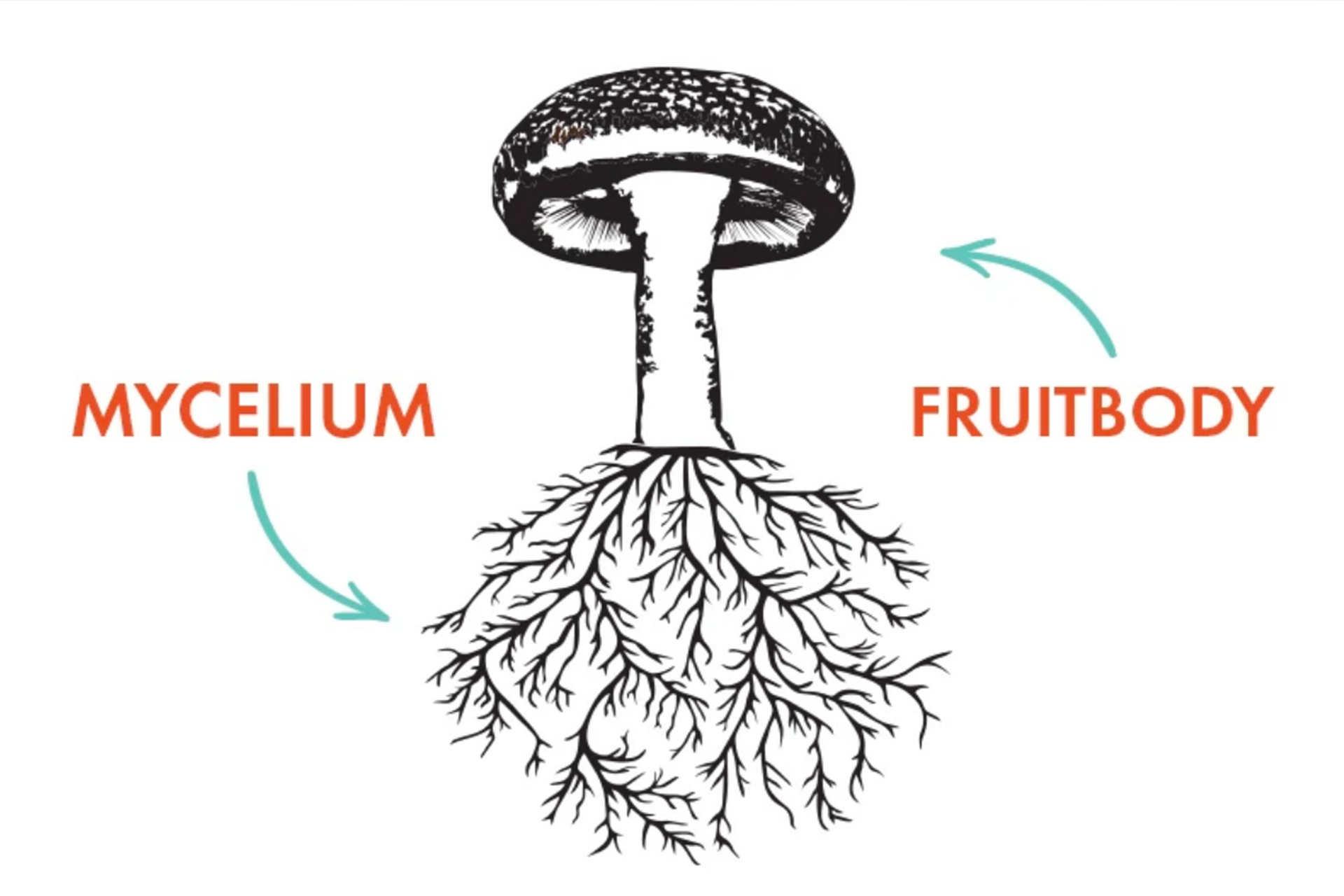The Science of Mushroom Anatomy: Mycelium & the Fruitbody

Host Defense® Talks with the Expert – Jerry Angelini talks about why we use beneficial mushroom mycelium and fermented substrate in ALL of our supplements.*
Jerry Angelini is Head of Science Education at Fungi Perfecti® and Host Defense®. He has a Masters of Science and Rehabilitation Medicine degree from Boston University, and has been trained in Western Herbalism, Traditional Chinese Medicine and Ayurvedic medicine. With more than 30 years of experience, Jerry is an invaluable source of knowledge and an important part of our team. We sat down with Jerry to discuss how beneficial mushroom mycelium and the fermented substrate used to grow it play a vital role in the Host Defense® product line.*
The mushroom supplement industry has grown significantly in the last few years. That is in large part because research shows mushrooms to be an effective source of immune support, with different species providing additional support for various body systems. With this category growth has come a lot of misleading rhetoric surrounding the debate on which part of the mushroom is most beneficial. Many companies that just use mushroom fruitbodies in their supplements would have consumers believe that the fruitbody is the only part of the mushroom that offers health-supporting benefits. Some have gone so far as to develop a marketing strategy solely around the idea that mushroom mycelium and the substrate used to grow it, are nothing more than “filler”, claiming that mushroom mycelium and its fermented substrate “offer no health-supporting benefit”. While it is true that mushroom fruitbodies contain immune-supporting beta glucans – which is one of the reasons we include them in some of our formulations – fruitbody-only products are quite different than Host Defense® products containing mushroom mycelium and cannot be compared for a number of reasons.*
First, there are no published studies addressing direct immune activity in humans that compare fruitbody extract products against Host Defense® mushroom mycelium-based supplements. Host Defense® products have been found to be strongly immunologically active in ex-vivo human blood studies and in human clinical trials. Therefore, the most important factor for choosing Host Defense® is that our mushrooms have been independently proven to strongly engage and balance immune system activity.*
Second, Host Defense® uses the mycelium, the fermented substrate, and the fermented metabolites all together. This provides a far greater range of metabolically active compounds than what can be found in mushroom fruitbodies alone. Recent research has shown that in Host Defense® products, the mushroom mycelium and the fermented substrate are both immunologically active and offer a complementary array of health-supporting compounds.* The mycelium robustly engages NK cells, NK T cells, Monocytes, B cells and T lymphocytes. Note that the immune cells associated with allergic reactivity like mast cells and eosinophils are NOT engaged. The fermented rice engages the immune systems’ checks and balances to keep it from overreacting, thereby maintaining our immune response within the “Goldilocks Zone” (not too little, not too much, but just right!). Host Defense® mushroom mycelium-based supplements help support a strong yet balanced immune system.*
Third, while part of the activity is due to beta-glucan content, there is a range of polysaccharides and other compounds found within Host Defense® products which are also responsible for immune activation and immune modulation. Singling out beta-glucans as the only active compound neglects to take into account the complex chemistry of a whole mushroom product. The beta-glucan rhetoric is about isolation of a single type molecule. Use of mushroom mycelium captures a more extensive range of beneficial compounds. At Host Defense®, we have all of our products verified for identity, purity, composition, and strength by independent labs that use internationally recognized and validated testing methods.*
Fourth, Host Defense® is dedicated to furthering the research on mushroom mycelium and fruitbodies. In December, we collaborated with NIS, Inc., a third-party lab based in Oregon, to publish an open-access, peer-reviewed research article in the journal BMC Complementary and Alternative Medicine about the immune benefits of mushroom mycelium and fermented substrate. And just this year we published a peer-reviewed article in the Journal of Inflammation Research about the efficacy of the Host Defense® MyCommunity, a 17-mushroom species blend that is shown to actively engage the immune system. These are just a few of the many areas that Host Defense® is invested in and committed to researching mycological solutions for human health and educating people about the health-supporting benefits of mushrooms and mushroom mycelium. As part of our foundational value system, Host Defense® is dedicated to furthering research on mushrooms and finding new and innovative mycological ways to support human and planetary health.*
At Host Defense®, we follow the science. And years of industry-based research, along with both internal and third-party testing, tells us that mycelium-based mushroom supplements offer potent immunological support. In addition, research also confirms that the fermented substrate used to grow Host Defense® mycelium is also immunologically active. That’s why we use mushroom mycelium in ALL of our products – because it works!*

*These statements have not been evaluated by the Food and Drug Administration. These products are not intended to diagnose, treat, cure, or prevent any disease.
